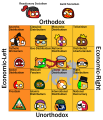Distributism is a third-way, free market economic system whose classic version is a culturally right wing ideology, inhabiting a moderate position in the Authoritarian Left quadrant of the Political Compass.
He is based on the Catholic social teachings, particularly the encyclicals of Popes Leo XIII and, to a lesser extent, Pius XI, and was developed into a more concrete ideology by Catholics in the 20th century, primarily Hilaire Belloc and G.K. Chesterton.
History
Beginnings
It all started back in 1891 with publication of Pope Leo XIII's papal encyclical, Rerum novarum. The piece discusses the conditions of the contemporary working class and supported the rights of labor to form unions, reaffirmed the right to private property, and criticized both the problems of socialism as it rose to prominence and the problems of unrestricted capitalism which were all too well known in his time. His Holiness set up the bedrock foundations of distributism, but English writer G. K. Chesterton and Anglo-French politician and philosopher Hilaire Belloc, after drawing together the disparate experiences of the various cooperatives and friendly societies in Northern England, Ireland, and Northern Europe, turned distributism into a more coherent and concrete ideology, with works ranging from basic economics through the distributist lens (Economics for Helen) to what makes property special (An Essay on the Restoration of Property) to the importance of
![]() decentralization in governmental institutions and productive property (The Servile State) to just summaries of the concepts alone (Outline of Sanity).
decentralization in governmental institutions and productive property (The Servile State) to just summaries of the concepts alone (Outline of Sanity).
The Mondragón Corporation
In 1941, a young Catholic priest named José María Arizmendiarrieta settled in Mondragón, a Basque town with a population of 7,000 that had not yet recovered from the consequences of the Spanish Civil War. Fr. José saw to the solution to these problems lay in the pages of Rerum novarum and other distributist authors. In 1955, he selected five young people to set up the first company of the co-operative and industrial beginning of the Mondragón Corporation. The corporation has grown to an organization that employs over 100,000 people in Spain, has extensive international holdings.
Beliefs
Distributism can be defined by four major tenets, which all distributists agree are necessarily distributist:
- Widespread ownership of property: Workers should be owners and businesses should be comprised of worker co-operatives, family businesses, or ESOP-based traditional businesses whenever possible and that people should own both their own personal private property as well as maintain some kind of ownership of private productive property whenever possible.
- The control of the production of wealth is the control of human life itself. - Hilaire Belloc
- Anti-Trust Legislation: Large businesses must be broken up into smaller, more local businesses whenever possible.
- The problem with capitalism is not that there are too many capitalists but too few. - G.K. Chesterton
- The Principle of the Subsidiarity: The government should never intervene in cases where a lower level of government (down to, and including, the individual, who governs himself) would be able to fix the issue. In short, if problem cannot be solved by level X, it goes to be solved by level (X + 1) and so on. This is also called "stratification of the federal government" or sometimes just "decentralization".
- Civil society exists for the common good, and hence is concerned with the interests of all in general, albeit with individual interests also in their due place and degree. It is therefore called a public society, because by its agency, as St. Thomas of Aquinas says, “Men establish relations in common with one another in the setting up of a commonwealth.” - Pope Leo XIII
- The Indivisible Unit: The smallest social unit is the family, not the individual as in capitalism and socialism. This means that laws must be considered with the full thought of the familial consequences as well as that laws must provide for family units rather than individuals because distributism recognizes that an individual is a part of the larger collective of his family and that what happens to him affects the family.
- Hence we have the family, the “society” of a man’s house — a society very small, one must admit, but none the less a true society, and one older than any State. Consequently, it has rights and duties peculiar to itself which are quite independent of the State. - Pope Leo XIII
Variants
 Chestertonism
Chestertonism
 Social Distributism
Social Distributism 

Social Distributism, or SocDist, sometimes mistakenly referred to as Left Distributism, is an ideological offspring based on ![]() Distributism but with more emphasis on social justice, environmentalism, and collectivized forms of labor, and has a unique strategy involving the adoption of crypto-technology to bring about widespread economic and political change. Social Distributism rejects the political notion of a Left-Right dichotomy and therefore rejects the Left's monopoly on social justice and collectivized labor and the Right's monopoly on private property, family values, and cultural tradition. Social Distributism is a syncretic ideology that transcends the traditional political binary and the popular political compass.
Distributism but with more emphasis on social justice, environmentalism, and collectivized forms of labor, and has a unique strategy involving the adoption of crypto-technology to bring about widespread economic and political change. Social Distributism rejects the political notion of a Left-Right dichotomy and therefore rejects the Left's monopoly on social justice and collectivized labor and the Right's monopoly on private property, family values, and cultural tradition. Social Distributism is a syncretic ideology that transcends the traditional political binary and the popular political compass.
Social Distributism believes that the means of production should be distributed as widely as possible to bring about universal property ownership. Social Distributism also believes that we should de-urbanize and form diverse and unique smaller communities based on shared values, goals, identity, etc including heterogeneous and homogeneous ones. Social Distributism believes that through breaking up unnecessary monopolies and central banks through the adoption of Blockchain technology and cryptocurrency we can create an alternative market crypto-economy full of small to medium sized businesses allowing for a diversity of cooperatives, privately owned businesses, union companies/trades, entrepreneurs, and public enterprises. SocDist believes that the State should nationalize essential industries such as education, healthcare, transportation, energy, and so on as Social Distributism believes they should not run on a profit-motive. Some may confuse Social Distributism for being ![]() Market Socialist, but of course it is easy to tell the many differences between the two - especially considering the fact that SocDists want universal ownership over the means of production rather than centralizing control into the hands of the State or the capitalist class.
Market Socialist, but of course it is easy to tell the many differences between the two - especially considering the fact that SocDists want universal ownership over the means of production rather than centralizing control into the hands of the State or the capitalist class.
 Distributist Social Democracy
Distributist Social Democracy
![]() Distributist Social Democracy, clipped to DistSocDem, is an
Distributist Social Democracy, clipped to DistSocDem, is an ![]() economically centre-left and culturally variable ideology which seeks widespread ownership of the means of production and a strong welfare state—combining
economically centre-left and culturally variable ideology which seeks widespread ownership of the means of production and a strong welfare state—combining ![]() Social Democracy with
Social Democracy with ![]() Distributism. Such an economic model is in sharp contrast to Social Democracy's common present-day manifestation, which is more
Distributism. Such an economic model is in sharp contrast to Social Democracy's common present-day manifestation, which is more ![]() neoliberal in character. It can also be seen as
neoliberal in character. It can also be seen as ![]() Social Distributism without the influence of
Social Distributism without the influence of ![]() Fourth Theory.
Fourth Theory.
Rather than wanting to 100% change ![]() Distributism to suit “socialist views”, he believes that both
Distributism to suit “socialist views”, he believes that both ![]() Social Democracy and
Social Democracy and ![]() Distributism must co-exist and reform themselves to create a
Distributism must co-exist and reform themselves to create a ![]() merger of the two, leaning into both socialist, democratic and religious values.
merger of the two, leaning into both socialist, democratic and religious values.
![]() DistSocDem finds that a lot of welfare programs and business regulations, when achieved through
DistSocDem finds that a lot of welfare programs and business regulations, when achieved through ![]() reform rather than revolution, can lead to higher prosperity for the people, rather than systems of
reform rather than revolution, can lead to higher prosperity for the people, rather than systems of ![]() unregulated (laissez-faire) capitalism or
unregulated (laissez-faire) capitalism or ![]() socialism, ideologies whom he sees as equally flawed and exploitative, while favoring economic mechanisms such as
socialism, ideologies whom he sees as equally flawed and exploitative, while favoring economic mechanisms such as ![]() cooperatives and member-owned mutual organizations as well as small businesses and large-scale competition law reform such as antitrust legislations.
cooperatives and member-owned mutual organizations as well as small businesses and large-scale competition law reform such as antitrust legislations.
Personality and Behavior
Distributism is often portrayed as a devout Catholic. He may be seen wearing a rosary or calling the Pope based. However, it's not necessary to be a Catholic, or even a Christian, to follow Distributism, it's just a call back to its origins/roots in Catholic doctrine and the works of Catholics who helped to define the movement. While he's not prone to violence, he does get rather mad when someone calls him a "Catholic socialist." Distributism is best friends with ![]() Agrarianism,
Agrarianism, ![]() Longism,
Longism, ![]() Georgism, and
Georgism, and ![]() Mutualism who are often in comics with each other, especially calling out the false dichotomy of capitalism vs socialism. He is often seen trying to find common ground with other ideologies, often successfully (subsidiarity with libertarians, co-ops with market socialists, etc.). Distributism
Mutualism who are often in comics with each other, especially calling out the false dichotomy of capitalism vs socialism. He is often seen trying to find common ground with other ideologies, often successfully (subsidiarity with libertarians, co-ops with market socialists, etc.). Distributism likes LOVES the works of J.R.R. Tolkien.
Distributionism also has split personalities like ![]() Tridemism
Tridemism
How To Draw

Drawing Distributism is rather complicated, its flag is based on a design posted on Reddit by a now deleted account:
- Draw a ball
- Draw a line in orange (#FC8922) vertically on the leftmost third and fill it in.
- Fill in the rest of the ball with orange-yellow (#FCC52B)
- Draw a dog in grey (#B0B4BC) carrying a torch (#898E95) with the flames stretching leftwards in deep red (#9D1D25). This can be as detailed or as vague as you want; we can't all be Van Gogh.
- Add the eyes, and you're done!
| Color Name | HEX | RGB | |
|---|---|---|---|
| Orange | #FC8922 | 252, 137, 34 | |
| Orange-Yellow | #FCC52B | 252, 197, 43 | |
| Grey | #B0B4BC | 176, 180, 188 | |
| Slightly Darker Grey | #898E95 | 137, 142, 149 | |
| Deep Red | #9D1D25 | 157, 29, 37 | |
Relationships
Friends
 Christian Democracy - My more moderate brother. You have done well.
Christian Democracy - My more moderate brother. You have done well. Agrarianism - My neighbor in all things.
Agrarianism - My neighbor in all things. Longism - EVERY MAN A KING AND NO ONE WEARS A CROWN!
Longism - EVERY MAN A KING AND NO ONE WEARS A CROWN! Paternalistic Conservatism - Finally, someone who gets it!
Paternalistic Conservatism - Finally, someone who gets it! Conservative Socialism - Another cool guy, if a bit extreme at times.
Conservative Socialism - Another cool guy, if a bit extreme at times. Market Socialism - Read different books, but came to nearly the same conclusion.
Market Socialism - Read different books, but came to nearly the same conclusion. Anarcho-Monarchism - This video and anything JRR Tolkien ever wrote on politics.
Anarcho-Monarchism - This video and anything JRR Tolkien ever wrote on politics. Guild Socialism - I love you, dad, but I'm not a socialist.
Guild Socialism - I love you, dad, but I'm not a socialist. Although socialism does have a lot of great ideas. Corporatism - Fellow traditional economic system, like me, but more centralized and regulationist.
Corporatism - Fellow traditional economic system, like me, but more centralized and regulationist. Georgism - Despite our initial setbacks, we have become the best of friends & allies in the fight against the concentrated ownership of land.
Georgism - Despite our initial setbacks, we have become the best of friends & allies in the fight against the concentrated ownership of land.
Frenemies
 Socialism - Workers owning the means of production is nice, but we shouldn't abolish the entirety of private property to do that. Not to mention I believe markets are nice.
Socialism - Workers owning the means of production is nice, but we shouldn't abolish the entirety of private property to do that. Not to mention I believe markets are nice. Catholic Socialism - Not much against the guy, BUT I'M NOT A CATHOLIC SOCIALIST!
Catholic Socialism - Not much against the guy, BUT I'M NOT A CATHOLIC SOCIALIST! Your ideas are pretty based, though, ngl. Mutualism - Love u buddy, but get a government (and find Jesus too).
Mutualism - Love u buddy, but get a government (and find Jesus too). Libertarian Market Socialism - Same as the previous guy.
Libertarian Market Socialism - Same as the previous guy. Reactionary Socialism - Grandpa needs to chill, even if he has some good ideas.
Reactionary Socialism - Grandpa needs to chill, even if he has some good ideas. Social Democracy - Has the right ideas about combining markets and re-distributive policies to create a more humane economy, but his centralized execution tends to the symptoms rather than the cause.
Social Democracy - Has the right ideas about combining markets and re-distributive policies to create a more humane economy, but his centralized execution tends to the symptoms rather than the cause. Libertarianism - Has good ideas about decentralization, but his economic ideas lead to exploitation and derangement.
Libertarianism - Has good ideas about decentralization, but his economic ideas lead to exploitation and derangement. Social Libertarianism - Cultural left? ECH! Besides that you're pretty ok.
Social Libertarianism - Cultural left? ECH! Besides that you're pretty ok. Anarcho-Distributism - My weird daughter. The state is a good thing, damnit!
Anarcho-Distributism - My weird daughter. The state is a good thing, damnit! Strasserism - Wants widespread private ownership and likes guilds but is too radically right-wing. Still better than
Strasserism - Wants widespread private ownership and likes guilds but is too radically right-wing. Still better than  National Socialism though.
National Socialism though. Conservative Liberalism &
Conservative Liberalism &  Libertarian Conservatism
Libertarian Conservatism  - Based social ideas, but your economic ideas lead to the exploitation of and disenfranchisement of workers, leading to cultural liberalism. I am the key to what you want!
- Based social ideas, but your economic ideas lead to the exploitation of and disenfranchisement of workers, leading to cultural liberalism. I am the key to what you want!
Enemies
 National Socialism,
National Socialism,  Tankie,
Tankie,  Fascism - Godless tyrants.
Fascism - Godless tyrants. Neoliberalism - Absolutely awful idea.
Neoliberalism - Absolutely awful idea. Pink Distributism - You're anti-catholic, horny AND a fag?? I'm putting you up for adoption.
Pink Distributism - You're anti-catholic, horny AND a fag?? I'm putting you up for adoption. State Liberalism - Free-market capitalism AND pushing individualist propaganda? Exploitation! Destruction of families! Degeneracy! You sound like the devil himself!
State Liberalism - Free-market capitalism AND pushing individualist propaganda? Exploitation! Destruction of families! Degeneracy! You sound like the devil himself! Satanic Theocracy - And you are the devil himself!
Satanic Theocracy - And you are the devil himself! State Atheism - Godless tyrant that will burn. Also, stop confusing me with
State Atheism - Godless tyrant that will burn. Also, stop confusing me with  him!
him! Plutocracy,
Plutocracy,  Corporatocracy,
Corporatocracy,  State Socialism, and
State Socialism, and  State Capitalism - My arch-enemies! They stand in the way of the widespread ownership of wealth.
State Capitalism - My arch-enemies! They stand in the way of the widespread ownership of wealth.
Further Information
Literature
- Rerum novarum - Pope Leo XIII's thoughts on the exploitation of working class people by socialism and capitalism
- The Servile State by Belloc
- Economics for Helen by Hilaire Belloc
- The Outline of Sanity by Chesterton
- Utopia of Usurers by G.K. Chesterton
- Toward a Truly Free Market: A Distributist Perspective on the Role of Government, Taxes, Health Care, Deficits, and More by John C. Médaille
- Unlocking Existentialism In An Economy: Southern Distributism in a Nutshell by Kyle J. Ewart
Articles
Wikipedia
Videos
- A short video
- Distributism 101 with John Médaille
- Building an Ownership Economy Video Series - A secular look at the worldview, philosophy and economics of Distributism
Online Communities
Gallery
-
-
-
The Distributist family.
-
Distributism and his friends.
-
Social Distributism
-
Social Distributism
-
Distributist Compass
| | |
| | |
ru:Дистрибутизм pl:Dystrybucjonizm zh:分配主义
- ↑
 Fourth Theory was to an extent an influence upon
Fourth Theory was to an extent an influence upon  Social Distributism, but both are formally distinct from each other.
Social Distributism, but both are formally distinct from each other.
- ↑ Chesterton was against women's suffrage. (pg.154-157)
- ↑ Chesterton supported Robespierre's theistic justification for the French Revolution, as opposed to Burke's "atheistic" justification against it. (pg.257-258)






